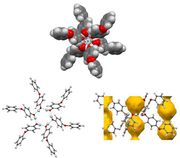Structural Chemistry for Function
We undertake a wide range of research in our underpinning area - the development of new solid-state molecular materials with optimised properties. Our materials development is based around the concept of Crystal Engineering, and involves joining molecules together using intermolecular interactions such as hydrogen bonds. Our "synthesis" is usually very gentle conditions - based on the crystallisation or co-crystallisation of components. Underlying this is an appreciation of and interest in the fundamentals of solid-state molecular association, including studies of hydrogen bonding and polymorphism.
The target physical properties for our materials discovery include optical (colour, refractive index, non-linear effects), electronic effects, porosity, mechanical (e.g. compressibility), particle size & shape control and solubility. These target properties are directly relevant to our research in the two "application" domains in which much of our current work is rooted:
The generation and control of optical and electronic properties, and the generation of porosity in solid state molecular systems, are key drivers within the M4 programme, part of our work in Dynamic Switchable Chemistry;
The properties of solubility and compressibility are crucial for the manufacture and processing of a solid forms of a range of fine chemicals including pharmaceuticals and agrichemicals, while control of particle size and shape is vital for processing; we are exploring these effects particularly ion the continuous crystallisation environment that is a key driver with our work in Crystallisation for Manufacturing.
